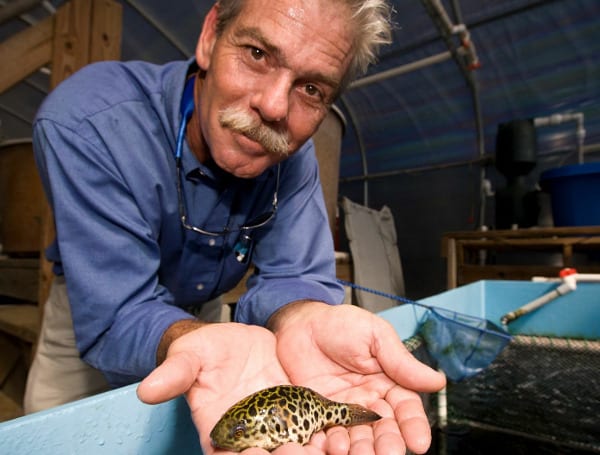Aquarium hobbyists count on the hard work of tropical fish farmers to supply the species they adore. Think barbs, tetras, angelfish, and more.
As a UF/IFAS multi-county tropical aquaculture Extension agent nearly 30 years ago, Craig Watson was doing his best to teach fish farmers in Hillsborough and Polk counties everything he knew. But Watson and other Extension faculty needed more data to share.
“I had a microscope and a water-quality kit, but we didn’t have the resources to really dig into what was going on and to provide answers to farmers,” said Watson.
In 1996, using a National Weather Service surplus building in Ruskin — about 25 miles south of Tampa — an adjacent fish farm and seed funding from several groups, UF/IFAS built what is now the Tropical Aquaculture Lab. Faculty, staff and tropical fish farmers are now celebrating the lab’s 25th anniversary.
The lab consists of a 5,000-square-foot office and disease lab, a 6.5-acre fish farm, five greenhouses 48 ponds and a hatchery building.

Courtesy, UF/IFAS photography.
“How cool is it that the state has this unique and complex vibrant tropical fish industry?” said Watson, the only director the lab has ever had. “And how cool is it that we were able to create a land-grant program with teaching, research and Extension? We work with an industry that has more than 1,000 species of fish, along with their varying farming and production methods. It’s been really exciting.”
Through TAL’s research and Extension, tropical fish farmers and aquarium enthusiasts save millions of dollars annually, said Watson.
For example, due to an early project that UF completed, Florida farms are now producing millions of neon tetras each year, Watson said.
It’s not just that they develop methods to grow new fish. Those same farmers bring them diseased fish, and the lab’s on-site fish veterinarian, Roy Yanong and his team diagnose the illness and prescribe medication. Recently, Yanong worked with farmers in Polk and Hillsborough counties — along with scientists at the main UF campus in Gainesville — to develop a vaccine for a sick fish species. That vaccine saved the farmers $12 million in one year.
In addition to research, TAL faculty also conduct outreach to tell fish farmers about new findings from the lab and from Gainesville. Those findings include analyzing the risks of non-native species surviving if they get loose, and what impacts they might have if established. The farms and state agencies can then use this information to decide what species are safe, and how they should be raised to prevent problems in our environment.
Faculty at the lab also mentor UF/IFAS graduate students, meeting the teaching element of the UF/IFAS land-grant mission. Employers across the nation covet the lab’s graduates and the important workforce development aspect of the lab.
“I get at least one email per week, asking me who’s graduating from the lab soon and if they’re available for job interviews,” Watson said, only too eager to tout soon-to-be alumni for careers in aquaculture.
- Florida Woman Punches KFC Drive-Thru Employee, Charged With Child Abuse
- POLL: Growing Number Of Americans Want Increased Funding For Police
- Trump Jr. Salutes Liberal Washington Post Backtracking From ‘Let’s Go Brandon’ Whitewash Attempt
- Frontier Airlines Denies Boarding For Florida Family Taking Child To Boston For Medical Care Over Mask
- Florida Senator Claims Surgeon General Ignored Mask Request, But Huddles With Democrats While Maskless
- Walmart Goes “Woke” Pushing CRT, Telling White Cashiers And Shelf-Stockers That They Are The Privileged Members Of ‘White Supremacy System’
Support journalism by clicking here to our GoFundMe or sign up for our free newsletter by clicking here
Android Users, Click Here To Download The Free Press App And Never Miss A Story. It’s Free And Coming To Apple Users Soon
